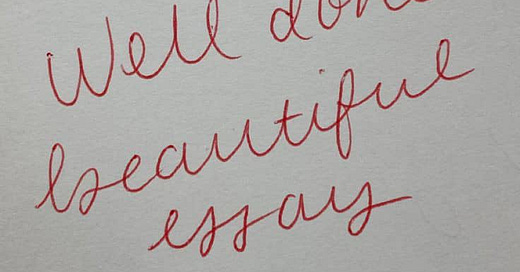Hello everyone and welcome back to my humble space. Today, I’ll be breaking down the steps required to write a jaw dropping, pocket filling and mind-blowing essay.
“What is an essay?” You might be asking. An essay is a literary piece that seeks to entertain, inform readers about a topic or convince them about a personal point of view. Essays are usually quite short and within the word limit of 500-100 words. There are different kinds of essays that serve unique purposes. I’ll try to talk a bit about them later on.
If you’ve been staring at your screen for hours on end, unsure of how exactly to start your essay or you’ve been assigned a topic that is quite overwhelming, then get down, this is your stop. I’m pretty sure that by the time you’ve finished reading this, you’ll know exactly how to get the best results while writing.
Now, so that you understand what exactly this post will be about, here are the pointers I’ll be discussing.
· What to do before you start your essay.
· Rudiments of an excellent essay.
· What to do after you write your essay.
What to do before you start your essay.
An essay isn’t something you just fly into. Even I didn’t just start writing this post down, hoping y’all would understand all my disorganized thoughts. So, here are some preliminary steps you can take even before you start.
1. Identify the kind of essay you’re writing.
Like I mentioned earlier, there are a lot of different kinds of essays. And in my experience, competitions don’t usually explain the type they’re looking for, they just expect you to figure it out from the theme. For example, in the essay competition I recently entered, the Ed-explore essay contest, participants were required to talk about a UNILAG Landmark that holds an important memory for them. That’s a narrative essay. It’s an essay that’ll tell a story which could be fictional or non-fictional. While it’d be important to describe the landmark, what will really pull your judges in is the emotional depth of your memory.
An expository essay would require you to expose your reader to new information and insightful knowledge that they probably didn’t know they needed. An academic essay will be strictly graded and is to be written with adequate knowledge of the necessary facts. Make sure you know what you’re trying to write before you start writing it.
2. Do your homework.
You can’t start an essay without research. In fact, its not advisable to begin any piece of writing without digging deep and uncovering the necessary facts. Save files, jot, keep all the information you feel will be necessary for your piece. And when you’re researching, make it fun. Listen to music if that’s what keeps you focused. If you enjoy what you’re reading, chances are, you’ll remember it while writing and your essay will flow so much better.
3. Make an outline.
Writing an essay without an outline is a recipe for disaster. You’ll end up with a disorganized essay, a rushed one, a rant or better still, no essay at all. You need to plan your essay from start to finish. Figure out what you want your hook to be—I’ll explain that under the rudiments—and write it down. What do you want your introduction to say? Figure out how each point will fit into each paragraph. By the time you’re done with the outline, you’ll be itching to start the essay.
4. Pay attention to the organizers.
Sometimes, competition hosts organize seminars where they give you information about the topic and explain what they expect of participants. Go over, take a seat and listen. Make sure you pay rapt attention to the little details and ask questions if you’re unclear about anything. Always ask questions. The worst they can do is not answer you, really. I’ve been there.
*Dusts hands* Now that that’s out of the way…
Rudiments of a good essay.
Now that you’ve prepared your outline and done your research, I’m sure you want to skip this part and just start already. But before I let you go, it’s crucial you understand the structure of an essay, it’s parts and how best to maximize those parts. The structure of an essay is very simple and can be broken down into three main parts, the introduction, the body and the conclusion. I’ll be leaving tips on how to work on each segment.
1. The Introduction.
The introduction is one of the most important parts of your essay. Writing an essay is a bit like recording an Instagram reel. From the very first statement, you already know whether you want to keep watching or scroll. That’s what your introduction does for the judges. If your first line is a bland definition or filled to the brim with jargons then the judges will have a poor first impression. You’ll need an introduction that makes them excited or curious about what they’re about to read. This is where the hook comes in.
A hook in this context, is the line you use to snatch the attention of your readers or judges. It needs to make people interested, shocked or evoke some reaction out of them. It could be a funny line or a shocking fact. After you’ve crafted a very good first line, you can follow it up with a definition of key terms if necessary or facts that prove your point if you’re writing an argumentative essay.
If you’re writing an expository or argumentative essay, you’d also want to sign post. Signposting means inconspicuously listing your key points before you explain them exhaustively in each paragraph. This is just to make sure that your readers know what they’re in for.
Here's an example of a hook from my essay.
“Light was never constant at the nation’s pride.”
You smiled at that didn’t, you? Exactly. That’s the kind of impression you need to make on your readers from the get go.
2. Body.
The body of your essay is the main part. It contains all your points; it’ll be the main area for cooking and it’s where most of your marks for originality and accuracy will come from. Just because you’re writing on a topic like “a study of unemployment in Nigeria.” doesn’t mean it should be a drag. If you made an outline like I suggested in the first part of this post, you should already know what to do.
Please and please, let each paragraph contain one point. This is the reason why an outline is very important, so you don’t start trying to stuff three points in five lines or use five hundred words to talk about one point. Let your essay be balanced and flow easily. Think about it as a drawing. You laugh at cartoon characters who have heads as big as watermelons and bodies the shape of broom sticks, right? Yeah, don’t let your essay be like that.
Also, use linkers. But don’t use them in an annoying way. A linker is a conjunction you place at the start of each paragraph to join it to the one before it. Let your essay flow smoothly. It shouldn’t be an abrupt and bumpy ride from start to finish. Conclude one point before you start the next. And please, don’t use firstly, secondly, thirdly. You’ve been reading this post and you didn’t see any of that. If I were a judge and I saw that in an essay, I’d be repulsed.
Maximize your opening sentences as well. Just like the introduction, let each paragraph have a hook that makes the reader eager to understand what you’re trying to say. Remember that writing an essay is not an excuse to flex your grammar or a show of jargon. Hit the nail on the head and move to the next point.
And one more thing, always, always keep your wordcount in mind. It can be very easy to exceed an essay wordcount particularly for experienced writers. They tend to be quite small and limiting. Use an app like google docs that gives you the option of displaying the wordcount as you type.
3. Conclusion.
Your conclusion is like the neat little ribbon you put on top of a gift or a cherry on an ice cream Sunday. It’s not supposed to be used to introduce new points that don’t have a paragraph of their own. It is also not supposed to contain extra facts that were omitted from the introduction.
Your conclusion should tie up and summarize everything you’ve said. It should also reiterate the key point you were trying to make. For a narrative essay, you could leave a cliff hanger in there for a greater impact and for an expository essay, a deep, metaphorical and thoughtful last line will leave your readers in a reflective state making it hard for them to forget your piece.
And finally— wait, don’t leave just yet! — After you’ve written your essay, what are you doing to do next? Didn’t you think there was a next step?
Pele, pele [sorry, sorry] We’re almost done.
What to do after you’ve written your essay.
Nothing, just sit back and relax. Lol, I’m just joking. To make sure you win that essay contest, here are a few extra things you’d want to do.
Edit and rewrite it if need be.
You don’t have to panic if the essay isn’t another banger. Don’t be so impatient to submit that you don’t take your time to edit, read through and rephrase certain points. Your first draft is almost never your final draft so, it’s okay if it sucks. Take your time and make sure you’re putting your best foot forward.
Show it to someone.
Sometimes, your work will look like a masterpiece to you but then someone else will read it and explain to you why it’s not making any sense. A second pair of eyes can be really helpful with essay writing. Your friend can let you know if your hooks are working and if your essay is really impactful. You can tell if it’s going to win an award from how strongly someone else reacts to it.
Read it aloud.
This is important because it helps you test the flow of your writing. If it doesn’t flow easily on your tongue then it won’t flow easily in the mind of another person. This also helps with editing because reading out loud conditions you to focus on the words and punctuations. Your thoughts won’t distract you as much and it’ll be easier to spot grammatical and punctuation errors.
Right, so I really hope this helped. Those are the basics you need to write an amazing essay. Let me know in the comments if I missed anything or you have any tips you’d like to share. You can also let me know—be a witness—that these tips worked out for you when you try them out. Thank you so much for reading.
Till Next week!






